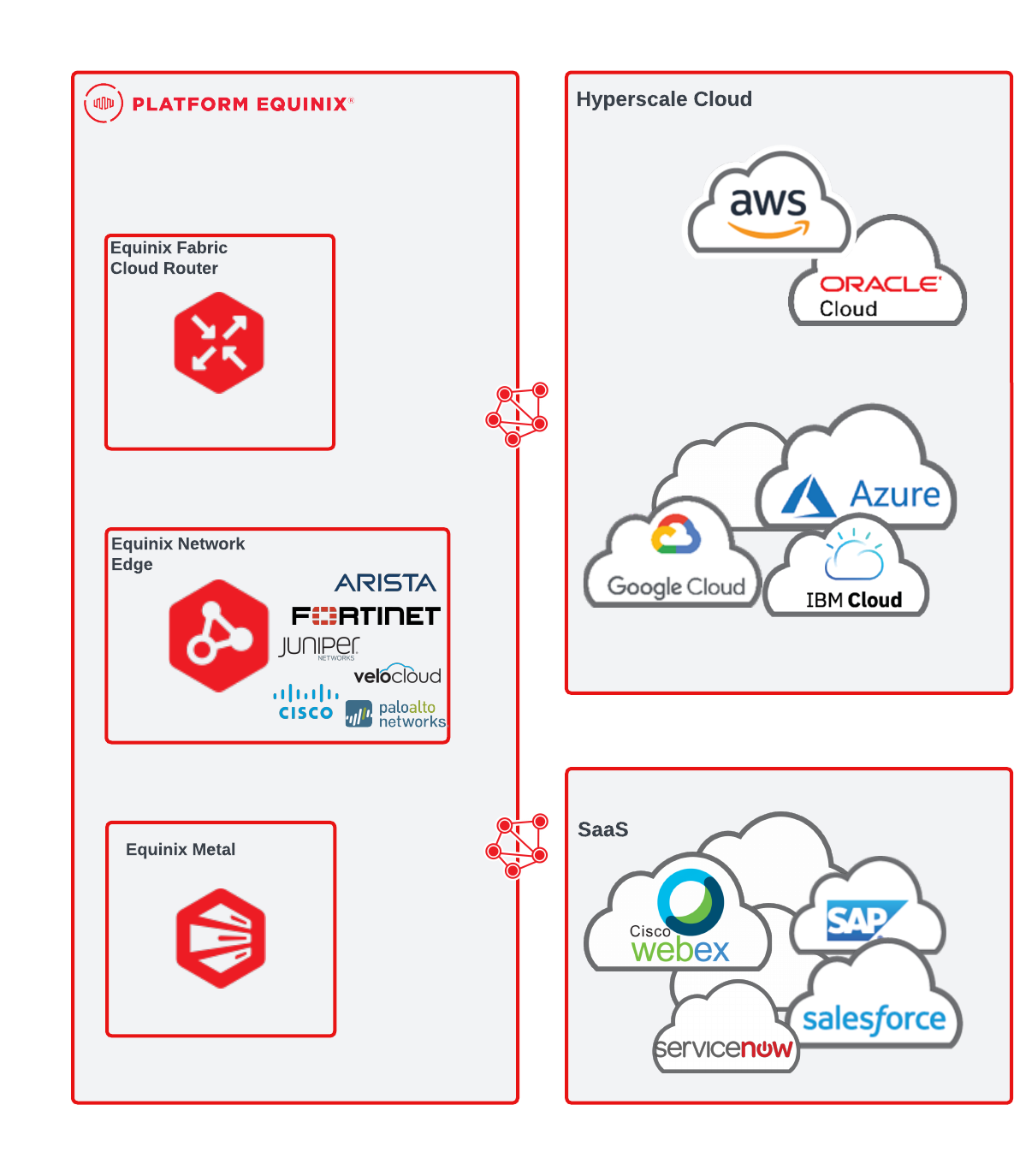- Home /
- Resources /
- Learning center /
- A Customer's Guide...
A Customer's Guide to Multicloud Networking at Equinix
In this article we go over what is multicloud networking and which Equinix products enable multicloud networking.

On this page
So, you’ve ended up with infrastructure across multiple clouds...
In today's fast-changing digital world, the idea of relying on a single cloud system that does everything is slowly being replaced by a more flexible approach called the multicloud revolution. This new way of thinking acknowledges that different cloud providers have their strengths and specialties. Organizations can benefit from this by spreading their tasks across several cloud platforms in an intelligent way.
Understanding the need for multicloud infrastructure
Beyond using a single cloud for what it is good for, multicloud infrastructure fundamentally concerns the distributing application between multiple cloud environments, whether Public or Private clouds. Multicloud allows organizations to leverage the strengths of multiple cloud providers and create a hybrid or distributed cloud architecture to build flexible and resilient IT infrastructure.
-
Load Balancing: Equinix's multicloud support empowers businesses to distribute network traffic across different cloud environments, optimizing resource utilization and preventing bottlenecks.
-
Redundancy and Fault Tolerance: Equinix enhances the availability and resilience of applications and services by routing traffic across multiple cloud providers. If one cloud provider experiences issues, traffic can be automatically rerouted to ensure uninterrupted operations.
-
Performance Optimization: Equinix's multicloud support allows organizations to choose the optimal cloud provider for specific workloads or regions. This ensures the best possible performance by directing traffic through providers with low latency or high bandwidth in a given area.
-
Cost Optimization: With Equinix's dynamic routing, organizations can capitalize on pricing variations among cloud providers. By routing traffic based on cost considerations, businesses can optimize cloud spending and take advantage of cost-effective options.
For more information, check out these references: NXP Semiconductors | Megaport and Fugro Roames | Megaport
What are the challenges in supporting multicloud infrastructure?
Building and managing a multicloud infrastructure comes with several challenges that organizations need to address. Five significant challenges include:
-
Internet Connectivity: Multicloud environments involve multiple cloud providers hosted across different data centers and regions. This can lead to challenges in establishing reliable and high-speed internet connectivity between various clouds, potentially causing latency and connectivity issues that can impact overall performance and user experience.
-
Security: Security is a critical concern in a multicloud setup. Managing consistent security policies, access controls, and data encryption across different cloud providers can be complex. Inconsistent security practices can lead to vulnerabilities and increase the risk of data breaches or unauthorized access.
-
Cost (Egress Charges): Data transfer between different cloud providers can result in egress charges, where costs can quickly accumulate as data moves between clouds. This can make cost management and budgeting difficult, especially if there isn't a clear understanding of the data transfer patterns and associated charges.
-
Performance: Achieving consistent and optimal performance across different cloud providers can be challenging due to varying infrastructure, network latency, and resource availability. Ensuring that applications perform well across different clouds while maintaining a consistent user experience can be demanding.
-
Architectural Consistency: Each cloud provider operates its own network infrastructure with different features, capabilities, and geographic coverage. Ensuring that applications and tools can handle these differences can be challenging.
Addressing these challenges becomes a critical consideration for all organisations wishing to realise the true value of multicloud.
For more information, check out this example: Virtual Hybrid Cloud and MultiCloud Connectivity With MCR | Megaport
The Equinix Difference
Equinix’s approach to multicloud is based on adaptability. It allows businesses to easily connect to many cloud providers while keeping their systems working well and securely. Equinix has data centers strategically placed all over the world. This makes it easy to exchange data between different cloud systems quickly. This helps organizations use many clouds without worrying about speed or reliability.
As more and more organizations use multicloud strategies to make the most of different cloud providers, Equinix becomes a strategic partner. Equinix helps businesses deal with the complexities of multicloud architecture. Organizations can benefit from the multicloud revolution using Equinix's know-how and connected infrastructure. They can grow larger, reduce risk, and spend less as they work on digital projects.
Equinix offers a solution to the challenges of multicloud implementation. Their platform enables organizations to establish secure and high-speed private connections between different cloud providers, minimizing reliance on the public internet. This approach enhances the reliability and speed of communication between clouds, ultimately improving overall performance. Equinix's data center security measures, including physical security, access controls, and compliance certifications, provide a controlled and secure environment for multicloud deployments. Moreover, by leveraging Equinix's direct interconnection services, organizations can reduce egress charges by keeping data transfers within their ecosystem, leading to cost optimization. The platform's emphasis on high-speed, low-latency connections between cloud providers ensures consistent and optimal performance, bypassing the public internet's potential bottlenecks.
Equinix Digital Services Overview
Equinix's Digital Services form the cornerstone of an effective multicloud strategy, facilitating seamless connectivity, global interconnection, and network performance optimization.
Equinix also enables customers to seamlessly integrate cloud-adjacent private cloud infrastructure hosted at Equinix into their multicloud networking setup. This holistic approach ensures that our clients can achieve a robust and flexible multicloud network that aligns with their unique needs and goals
Here's an overview of some key services:

Equinix Fabric
Equinix Fabric is a software-defined interconnection platform. It enables organizations to establish direct and private connections to cloud providers, networks, own deployments, and partners within Equinix. This direct connectivity enhances performance, security, and scalability, bypassing the public internet. Equinix Fabric supports multicloud connectivity, automation through APIs, and offers a flexible solution for businesses to adapt their interconnection needs. It's a valuable and fast tool for creating efficient, secure, and high-performance connections.
Delivering seamless and swift access to various public cloud platforms, ensuring that customers can effortlessly harness the power of these cloud services.
Fabric Cloud Router
Fabric Cloud Router is a virtual routing service on Equinix Fabric that enables customers to create resilient, high-performance Layer 3 connections quickly and easily between their clouds, data centers and on-premises resources – all without the costs of owning and operating a vendor-supplied physical or virtual router.
While cloud deployments have become increasingly simple and flexible, many enterprises struggle to find an optimal networking solution to connect between their cloud, data center and on-premise resources with the same cloud-like agility.
Traditionally at Equinix, customers must first interconnect to their service destinations using Layer 2 point-to-point services and then configure the networking. This can lead to unnecessary complexity, costs, delays, security risks and resource constraints.

Network Edge
Equinix Network Edge delivers Network Function Virtualisation infrastructure (NFVi) that empowers businesses to deploy and manage network functions in a flexible and efficient manner. Customers can deploy essential networking resources such as routers, firewalls, and load balancers in close proximity to the cloud, creating a cloud-adjacent infrastructure that optimizes performance and efficiency.
With a marketplace of leading networking vendors, Network Edge ensures technology consistency with existing deployments. This approach simplifies the management of complex networking configurations, reduces hardware dependency, and provides the agility needed to adapt to changing business requirements.
Equinix Metal
Equinix Metal is a service that offers dedicated, high-performance physical servers in data centers all over the globe. It provides direct access to powerful compute resources without virtualization, thus allowing organizations to tailor their infrastructure, optimize performance, and connect efficiently to other services. It's a solution suited for various applications, emphasizing control and performance.
Choosing the right Equinix digital service
With so many options, you might be wondering what is the right solution for your organization?
Selecting the most suitable Equinix digital service for your organization involves understanding your multicloud needs. Following a systematic approach to choosing the service that aligns with your requirements will ensure optimal results.
Business Considerations
Equinix's multicloud networking solutions offer numerous strategic advantages for businesses:
-
Cost Efficiency and Optimization: Equinix's solutions facilitate optimal resource allocation across cloud providers, enabling cost-effective usage that aligns with an organization's budget.
-
Scalability and Flexibility: Equinix's interconnected data centers and multicloud networking provide the agility required for organizations to scale their operations seamlessly, accommodating changing demands and business growth.
-
Risk Mitigation and Business Continuity: Multicloud networking improves risk management and business continuity by allowing automatic rerouting of traffic during outages or disruptions, ensuring uninterrupted services.
Operational Considerations
Equinix's operational capabilities contribute to streamlined network management, enhanced security, and compliance:
-
Simplified Network Management: Equinix simplifies complex networking configurations, reducing hardware dependencies and enhancing operational agility, ultimately leading to more efficient network management.
-
Enhanced Security and Compliance: Multicloud networking improves security by enabling traffic rerouting during security incidents or outages, minimizing potential vulnerabilities. This also helps organizations comply with industry regulations and standards.
-
Reduced Latency and Improved User Experience: Equinix's interconnected data centers and strategic multicloud networking contribute to reduced latency, ensuring improved user experiences and application responsiveness.
Technical Considerations
Equinix's technical offerings empower a resilient multicloud ecosystem:
-
Network Architecture Design: Equinix's robust network architecture design ensures seamless connectivity and optimal performance across multiple cloud providers, fostering efficient data exchange.
-
Throughput and Performance: Equinix focuses on minimizing latency and maximizing throughput to ensure superior data transmission speed.
-
Application Performance Optimization: Multicloud networking enables businesses to direct traffic through providers with superior performance characteristics, ensuring excellent application responsiveness and user satisfaction.
Use Cases
Consider using Fabric if any of these multicloud statements resonate with you:
- You need to simplify high availability in your cloud.
- You need your vendor to provide high flexibility.
- You want to optimize latency a much as possible.
- You need a high amount of throughput between you cloud environments.
Consider using Network Edge is any of these multicloud statements resonate with you:
- You need a solution to assist in simplifying network management
- You need higher level functions beyond just routing (Firewall, SDWAN, load-balancing)
- You have existing vendors in your environment today and want to maintain consistency?
Consider using Metal if any of these multicloud statements resonat with you:
- You have experience virtualizing network functions.
- You have a specific security policy that you need enforced between cloud environments.
Conclusion
Equinix is your trusted partner on the journey to a successful multicloud future. By leveraging Equinix Digital Services, you can harness the power of multicloud architecture, drive innovation, and lead your organization toward unparalleled success.
Equinix supports businesses throughout the onboarding and implementation process, providing expert guidance and assistance. The transition to Equinix's multicloud networking solutions is designed to be seamless, enabling your organization to unlock the true potential of multicloud infrastructure.
Last updated
25 June, 2024Category
Tagged
ArticleYou may also like
Digger deeper into similar topics in our archives
Configuring BGP with BIRD 1.6 on an Equinix Metal Server
Set up BGP on your Equinix Metal server using BIRD 1.6, covering IP configuration, installation, and neighbor setup to ensure robust routing capabilities between your server and the Equinix...

Configuring BGP with FRR on an Equinix Metal Server
Establish a robust BGP configuration on your Equinix Metal server using FRR, including setting up network interfaces, installing and configuring FRR software, and ensuring secure and efficie...

Crosscloud VPN with Wireguard
Learn to establish secure VPN connections across cloud environments using WireGuard, including detailed setups for site-to-site tunnels and VPN gateways with NAT on Equinix Metal, enhancing...

Deploy Your First Server
Learn the essentials of deploying your first server with Equinix Metal. Set up your project & SSH keys, provision a server and connect it to the internet.

Ready to kick the tires?
Use code DEPLOYNOW for $300 credit